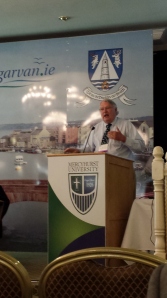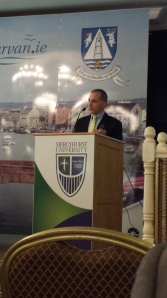This professional development post comes from Luke, MPP post grad 2014.
Here are my insights from attending Mercyhurst University’s Global Intelligence Forum in Dungarvan, Ireland from July 7-10, 2013:
During the panel on National Security Intelligence, Richard Kerr’s presentation resonated with me the most. Kerr, a former Deputy Director of the CIA, opened with an anecdote from his career. He joined the agency out of college without analytic training or a great understanding of exactly what intelligence analysis was all about. He attributed his rise from a lowly GS-7 analyst to deputy director to hard work and skill … and a little bit of luck. Sometimes a story like that is good motivation.
 (Richard Kerr, former Deputy Director of the CIA)
(Richard Kerr, former Deputy Director of the CIA)
He spoke about a range of issues, including the need for in-depth analysis and leadership advice for managers of analysts. A problem prior to the Iraq War was a shift to current intelligence (short-turnaround reports) and away from in-depth and rigorous intelligence. A deep understanding of foreign countries (cultures, languages, history, etc) is absolutely necessary for policymakers dealing with international issues. On the leadership issue, Kerr said that managers need to focus on two-way communication with analysts, and they should make sure analysts have ownership of and get credit for their work.
During a break I introduced myself to Mr. Kerr and broke the ice by mentioning a mutual friend. I’m sure he wondered who the two of us could possibly both know, but he was pleasantly surprised when I mentioned Batten Professor Fred Hitz, a former inspector general at the CIA.
During the panel on Law Enforcement Intelligence, each of the panelists and keynote speaker Louis Freeh seemed to have a nugget of good advice. Freeh acknowledged that analysts may face pressure to skew their analysis or investigations. In such cases he suggested that analysts deliver their findings in written products to ensure a record of their work. Don’t rely on oral briefs for difficult or controversial analysis, as they allow for poor memories, confusion, and ambiguity – whether intentional or not – to be issues . John Grieve, a former director of intelligence at Scotland Yard, reiterated Freeh’s point with a poem,
“Say it loud and write it down,
good investigators speak without a sound.”
 (Louis Freeh, former Director of the FBI)
(Louis Freeh, former Director of the FBI)
Another takeaway that transfers well from the law enforcement realm to the public policy realm came from a deputy commissioner of Ireland’s national police, Garda. He said that one of the biggest problems of policing is in the implementation stage. Great analysis is often wasted if the implementation of a policing policy fails. He recommended that analysts must be involved in implementation due to their depth of knowledge of the subject matter.
In opening the Business Intelligence portion of the conference, Secretary-General Robert Watt of Ireland’s Department of Public Expenditure and Reform gave the most Batten-appropriate speech of the conference. [Quick background: Ireland’s economy thrived before 2008, but the state’s fate turned quickly. Evidence of the quick shift are all of the half-completed construction projects around Dublin. The final toll was 20% decrease in GDP and 300,000 jobs lost.] Watt’s challenge is to reform public spending to put the nation back on track to a stable economy, including a reorganization of the public sector and banking industry.
Ireland has a new program to review social welfare recipients to detect fraud. A random sample of recipients is chosen and their characteristics (age, income, education, etc) are compared against a baseline of what a typical welfare recipient looks like. If a variable differs greatly from the baseline, then an investigation takes places to determine if there is fraud. This program detects 50% more fraud than traditional investigations at a lower cost. I’m not sure if I would completely understand the complex regression used by the department, but I did understand Mr. Watt’s explanation thanks to the first year at Batten.
Another change was with the Irish government’s procurement process. Agencies used to deal with procurement on individual basis, but they found that different organizations were buying the same goods from the same suppliers at very different prices. Part of the reform program includes using the government’s monopsony power on some goods and services to save $500 million by 2015.
A final noteworthy change is a government-wide HR program for all 35,000 civil servants. The government can now easily get a big picture look at the workforce at any one time. In a week when the weather was beautiful, Mr. Watt wondered if vacation days increased or if sick leave was heavily used. This information will be valuable for staffing and understanding how benefits are used.
There are a few final takeaways that didn’t fit nicely into this post, but are worth sharing.
- Know the decisionmaker and how to communicate with him/her. Brevity and crispness are key to having a report read and acted upon.
- Intelligence is information designed for action. The same definition could be used for policy analysis. When writing papers next year, I will remember to produce actionable analysis by reducing uncertainty about a given situation.
- Analysts must consider what value they are adding beyond just reporting the news or summarizing other analysis. Good analysis presents insight and opportunities.
- Decisionmakers should look for critical thinking, not consensus, in analysis.
- In a conversation with members of European militaries, I learned about the complexity of multi-lateral cooperation in the European Union. Professor Christine Mahoney‘s Political Institutions course gave me enough background to not make a fool of myself discussion the EU. I thought the US government was big and confusing, but I learned that EU is a whole other beast. Over 80 organizations deal with security and intelligence issues issues among EU member states, compared to about 16 in the US.
- Games are valuable teaching resources. Kris Wheaton, a Mercyhurst intel professor, has 10 years of data (client feedback from student projects) supporting the use of games and other innovative teaching methods in undergrad and graduate classrooms instead of dry, traditional lectures.
- The Commonwealth of Virginia was well-represented at the forum. The attendees included at least two UVA grads, a JMU professor, and GMU researcher. I spoke with the conference organizer who happens to be a family friend of one of my Batten classmates. So I heard some good stories that I can share in the fall. (See ya soon Ryan!)



 (Richard Kerr, former Deputy Director of the CIA)
(Richard Kerr, former Deputy Director of the CIA) (Louis Freeh, former Director of the FBI)
(Louis Freeh, former Director of the FBI)

